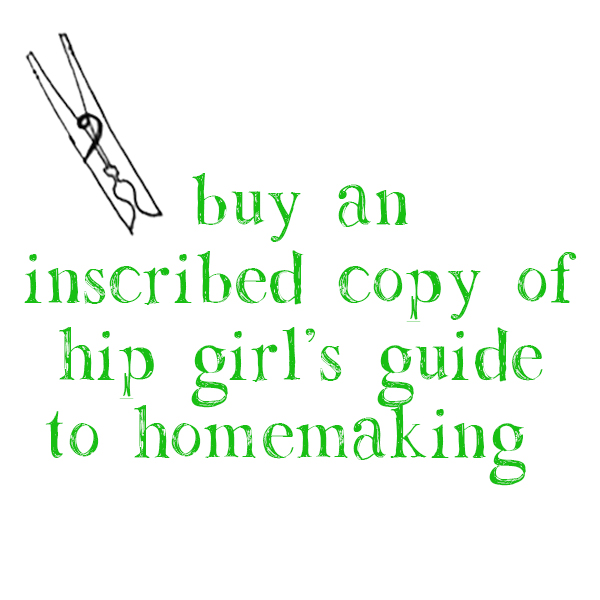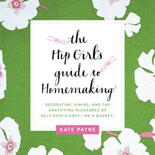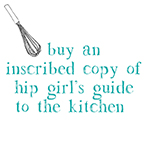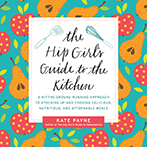Poor Girl Gourmet book giveaway
Good food is something that is so important to me and my family. I’m not just talking about flavor, but that comes as part of the package when we make our consumer choices based on how the animals, vegetables and grains we buy were treated, processed and shipped to us.
Some of you might know about my food stamps story, which I tell at length in my book (out in April). We moved to NYC and became acutely aware of our budget, $201 per month to be exact. While we worked long hours as a grad student and both of us freelance artists getting our careers off the ground, we needed help. We received food stamps from NYC for one year while J was in school. With this money we were able to eat all our meals at home (all three, really) and buy the majority of our food from local/sustainable sources all within the constraints of that $201, sometimes going over by $20-30; $230 for a month’s worth of food is still not breaking the bank for many under-employed people. Meat, of course, became a luxury item since we didn’t want to buy poor-quality, low-cost meats. We sourced our groceries from our food coop, from farmers markets around NYC (many of which accept EBT/food stamps), from pick-your-own farms and even one or two side dishes during the growing seasons from our own back-deck, bucket garden.
There’s still a huge stigma surrounding what food stamps recipients should spend money on, and unfortunately the roots stem deep into socio-economic factors and the still-very-prevalent stereotypes and rhetoric of welfare. As a former EBT recipient who was harassed in my food coop (of all places) for paying with EBT and owning an iPhone, I know it can be difficult. But as a self-employed person who still can’t afford health insurance, I’d rather spend an extra $1 at the grocery store on chicken raised without antibiotics than take my chances on food that’s not truly proven safe from a long-term health perspective. Medical bills are certainly not in our budget. We shouldn’t have to choose between taking care of our bodies with high-quality food and spending as little as possible on highly-processed, factory-farmed or GMO foods.
I know from experience that you don’t have to have money to eat food that’s both good for you and the planet. You have to be a wise shopper and learn to plan better in the kitchen, which is what I’ve been slowly learning over the past few years.
Now, off my soapbox, I’m so happy to share with you another great resource for beginning kitchen’eers, people who are just embarking on this journey or those of us who are getting the hang of it slowly. Cookbooks are a dime a dozen these days, but Amy’s book really stands out to me as one you should have on your shelf.
Poor Girl Gourmet covers the practical considerations behind eating like a king or queen at home. She adds it all up, highlighting money (or lack thereof) and getting high-quality groceries on a tight budget. The seven recipes (out of 83) that are more than $15 (and that all serve four or more people!) still don’t exceed $30. Where can you go out for a gourmet meal with three of your friends and spend less than $30?
One of my favorite things about this book beyond the price calculator and tips for getting the most bang for your buck at the grocery store is Amy’s coverage of wine and grape varietals. Up until now, I’ve happily proclaimed to know nearly nothing about wine, seeing as J is our resident wine expert. In this section Amy covers some of the great (low-cost) bottles that appear in our house regularly. I already feel more confident and empowered in the wine aisle when J isn’t by my side doing the choosing. [Next weekend I’m blogging at an Austin event called the Wine Ride, stay tuned for a breakdown of things I learn about wine pairings!]
And yes, guys, this is another book with girl in the title but is in no way for girls only. Amy shares her knowledge and love of the kitchen to anyone looking to eat better from their own kitchen.
 Enter to win this book, courtesy of Andrews McMeel Publishing, by leaving a comment on this post telling me a trick you use to keep grocery costs low, without skimping on quality. Any trick, no matter how big or small the savings.
Enter to win this book, courtesy of Andrews McMeel Publishing, by leaving a comment on this post telling me a trick you use to keep grocery costs low, without skimping on quality. Any trick, no matter how big or small the savings.
Enter by midnight on Thursday, Jan 27. Random.org will help me select a winner, who will be contacted on Friday, Jan 28. Entrants are welcomed from anywhere in the world, hooray for Andrews McMeel!
And don’t forget to leave an email address you actually check in the designated box on the comment form. Other readers won t be able to see it, just me, the person who will be emailing to tell you you won. If I don’t hear back from you by 5pm EST on the 28th, a new winner will be selected.
Good luck and happy eating!
 Kate
Kate
I got a comment this morning that was not really an entry for the book giveaway and in the interest keeping that thread going so the random number generator works as randomly as possible, I’ve removed it and placed it here.
“I’m stuck on the iPhone thing and food stamps… How did you pay the $100+ bill each month?”
I’m sure that other people have thought the same but haven’t said anything (not including the cashier guy at my co-op who decided I should be in abject poverty and give up the phone that I purchased years prior when I had a full-time job with benefits in order to fulfill his expectations of food assistance recipient). It’s important to me to address this because the whole reason I wanted to share my experience is to prevent judgement of people you see using food stamps.
Well, I’m learning that food stamps sorta belongs in the list of categories that bring up heated discussions no matter who you talk to: politics, religion, public assistance…Whatever your stance on it all, please know that until you walk a day in someone else’s shoes, you don’t really understand their situation.
While there are people out there who may have trust funds or independent means and like to pretend they’re poor or people who are just ‘milking the system’ so called, I’m not one of them.
I replied directly to the commenter this morning via email discussing with her the things that led us to, made us eligible for, and why we went off food stamps one year after starting them, which has most to do with my partner, J, finishing her one-year intensive, full-time grad program and being able to work more than 15-20 hrs/week.
I welcome constructive discussion about this topic at length via the discussions tab on the Hip Girl’s Facebook page.
 Kate
Kate
Silly me! I forgot to let you all know who won Amy’s delicious book.
After being graced with a zillion (ok, I’m an exaggerator) wonderful tips/entries by the deadline last week, let’s congratulate Amanda from Michigan. It was also her birthday on the Friday that she found out. Double fun; thanks all for such great comments.
 Budget Living,
Budget Living,  Cookbooks,
Cookbooks,  Giveaways
Giveaways 





Reader Comments (127)
I cook EVERYTHING from scratch (or just about). We all have tons of herbs & spices laying around the kitchen just because. One day, I decided to actually use them and I have been making my own spice mix since. I'm not sure when is the last time I bought taco seasoning, yet, we eat it quite often. Buying in bulk is another way to save, a lot of health food store have a bulk section where you can purchase better quality ingredients for less than grocery store. We grow our own garden, bake our bread, hubby even brew his own beer! I could go on for a while, being diagnosed with cancer at age 33 was a big eye opener, no more junk! (not that we ate a lot before).
my biggest tip is most likely the least used beyond shoping the ads & not just seeking out but using coupons (a simple organizer can help & if your lucky enough to have an app phone use the free coupon ap downloads so many stores won't take printed off computer coupons) is to keep a price journal because stores have cycle sales that U can track & use to save
Buy dried beans! We are big bean eaters at my house and I save money buying them dried in bulk. When I plan on using them I throw them in the crock pot all day. They are better for you (less sodium) and better for the environment (less waste).
Honestly, I do as much as I can to use up every bit of leftovers or little "extra bits" of meat, veggies, etc. Hash, frittatas, omelettes, soups, whatever, but I HATE wasting any of that hard-earned, healthy food! I do also share some of those "little bits" with our dog; they're good for his health, too. It isn't much but sometimes I think about the amount of food I've let go bad in the past and want to cry.
Cook from scratch, cook in bulk and freeze the extra. Saves money and time without skimping on nutrition.
Broth. All vegetable trimmings and bones go into the pressure cooker for broth right away or into the freezer for future use. I call it "compost soup" to myself, but not to my dinner guests.
well, honestly, i struggle to keep my food costs down, so i think amy's cookbook can help me be more gourmet and budget friendly in the kitchen! i have trouble resisting specialty items and planning (well, sticking to, really) a weekly menu. so i might not have any great tips, but sure could use some practical advice!
cooking from scratch, shopping once a month, and buy fresh only when it's needed. We also plan out menus so there's no surprises and no need for a quick run to the store. thanks for the opportunity!
Dried beans. Coupons & sales for household non-food items (toothpaste, shampoo, etc...). Buying in bulk and freezing. Making my own bread has been a huge help. Having bean soup for lunch a lot. Meal planning.
planning out the menu for the week is key! every friday night we make our dinner menu for the week, and then we make our grocery list accordingly; by planning out the menu in advance, we know we have everything on hand for the meals we need, and we are less likely to buy extra stuff that we don't need and will go to waste. we make big meals that yield leftovers which we pack for lunch the next day, so we save money by brown bagging it at work, too. and when you know what you're having for dinner that night, you're less likely to get tempted into going out to eat. finally, we keep an inventory of what is in our two freezers (inventory is updated weekly) so we don't buy more than we need and are more likely to use that chicken that's already in the freezer than buy a new one having forgotten about the one we already have.
We cut costs by not eating out - if we go on day trips, or even to town as we live outside of town - we pack snacks so we don't have to stop and eat. And most all meals consist of a small amount of meat - as it's the most expensive item - mixed with lots of veggies, rice, beans, etc.
I like to plan my meals to provide yummy leftover that we want to take to work. I make my own bread, kombucha, and kimchi. I also love this Mark Bittman article: http://markbittman.com/3-recipes-to-change-your-life-and-the-world.
the bulk section! also i try to never go out without a snack so i can avoid buying food out.
I cook everything from scratch and have figured out how to frugally cook for two people with lunch leftover for my husband the next day. We don't waste food that way. I have started making my own bread (and have made laundry detergent for close to a year now), which offsets the cost of the cost of the organic meat we consume. This book would be such a help! Thanks!
I've been "quietly" canning and preserving from fruit/veggies in my backyard and neighbors with abundant harvests, as well as u-pick farms for a couple of years. I've recently discovered some friends who do the same, and now we swap lots of our goodies! No more paying for jam, jelly, relish, bbq sauce etc! Plus it tastes tons better than the commercial stuff, and we know what's in it.
1. Weekly menu planning so I have a shopping list, which helps eliminate "extras."
2. I *try* (emphasis on TRY) to use up/freeze leftovers to reduce waste.
we buy and cook in one week lots- Sunday is cooking day - which gives us the time we crave on weeknights to just relax, and smart menu planning does most of the rest. the chicken we eat one week becomes the stock that is crucial to 2 or 3 recipes the next week, meanwhile i'm honing my preserving skills (i haven't bought jam at the store in almost six months, and i'm super excited by the pressure cooker i got for my birthday a few weeks ago), and we have high hopes for the garden we'll be planting next year (our buckets of herbs last year were great - now its time for a more expansive home-grown menu and to put that pressure cooker to work so we can enjoy those veggies year-round)
Our weekly produce share helps us save money. It sounds weird to most people that getting local, organic produce would save money but it means we aren't heading to the grocery store more often, which means we don't spend time wandering around and picking up unnecessary items. We get what we get and we have to cook with it - period.
I use the remains of a roast chicken to make my own chicken stock... I once calculated the savings for using my bread machine to make hamburger / sandwich rolls versus buying and was blown away at how much less it costs to make my own! And they taste better too. Lastly - we have lots of Asian supermarkets here in the suburbs of DC and there are many items - produce in particular - that are routinely less than at the mainstream grocery stores. I just bought a pint container full of fresh, whole peeled garlic cloves for $2! A package of celery was $0.50 less and a bag of carrots was only 69 cents.
Menu planning is my budget and sanity saver. Without a plan it is way too tempting to just go eat out or grab some quick junk for dinner.
I also like to make double batches of food from scratch and freeze half. This way I have some food put up to help on those nights where no one feels like cooking.
Grow my own herbs from seed. Herbs so expensive at the grocery store and I get mammoth tons of basil in my garden for months. So much so that I have to make pesto(s) so as not to waste it. Here in central Texas, rosemary grows everywhere -- snip some off as you drive by. I also grow oregano, lavendar, garlic chives, peppermint, spearmint, lemon balm and 4 types of thyme. It's cheap and easy and saves loads.
i don't have a huge yard (just a tiny townhouse) but making the most of the little garden saves huge in the grocery store.
as grad students, my husband and i feel as though we have no time to cook as cheaply as we probably could. we shop trader joes and choose organic, free range, etc. we also receive a local, organic produce delivery once a week and only use those fruits and veggies which are both in season and support local farms. this has made us more creative (i.e. roasted root veggies in an onion soup mix) and freed up time in the grocery store. we still spend a lot on meat, bread, wine, and treats. i'd love the book for ideas on how to better our attempts at conscious eating and cooking.
Ordering a weekly share and doing most of my additional shopping at a co-op lets me know exactly how much money I am spending on food. This certainly helps me maintain a tight budget and keep my priorities straight about where my food comes from.
This books looks great; thanks for the giveaway! I actually find many of my money saving tips *improve* the quality of our food. For example, I no longer buy canned beans, as I used to. They are full of sodium! I buy bulk dried beans, prepare them ahead of time, freeze them in small batches, and use as needed. Cheaper, healthier, AND tastes better!
I try to plan a weekly menu and grocery shop accordingly. I always leave some wiggle room in the menu and try to take advantage of sales when I get to the store. I just started looking into baking my own bread. I have a recipe, now I need to try it!